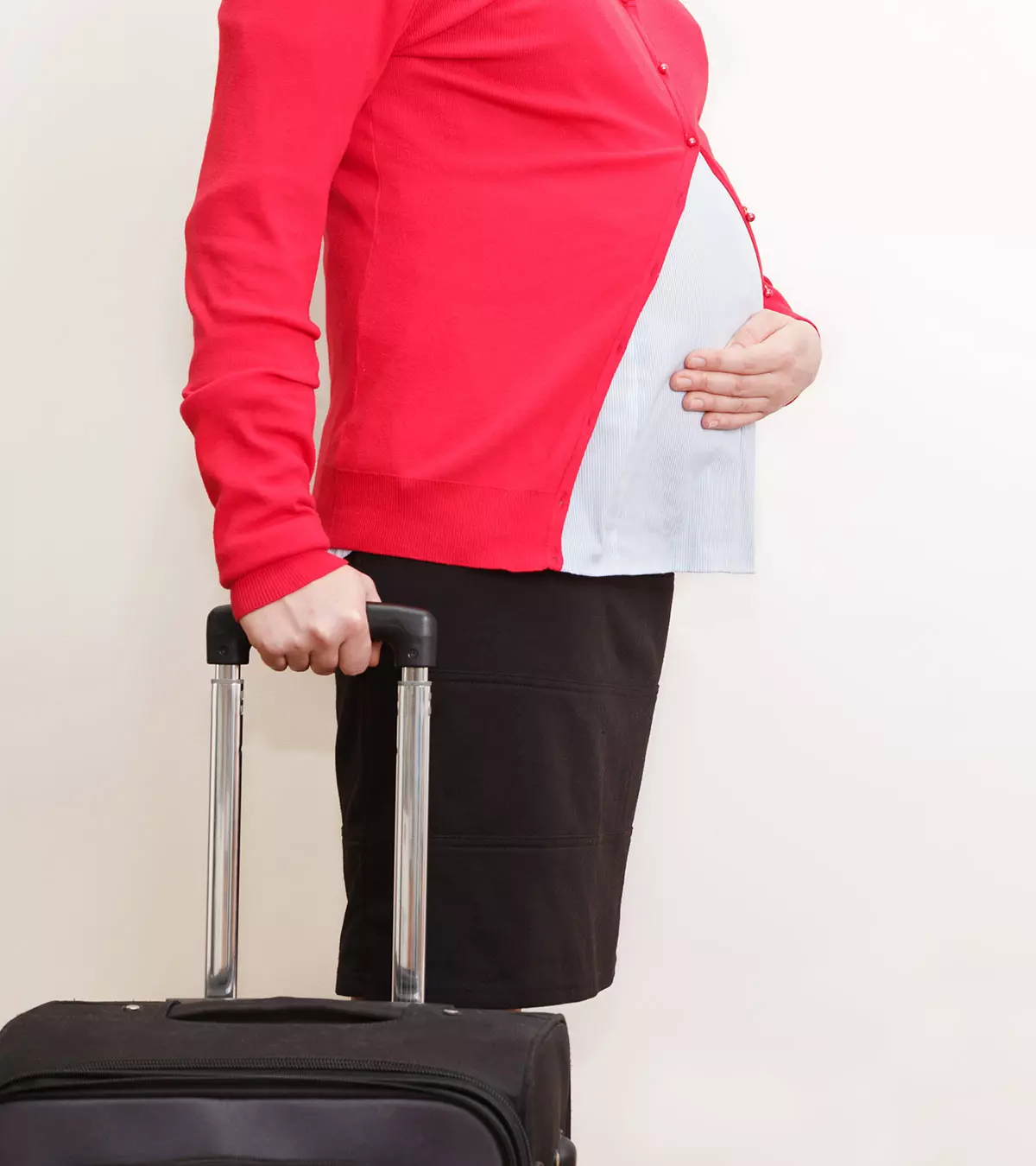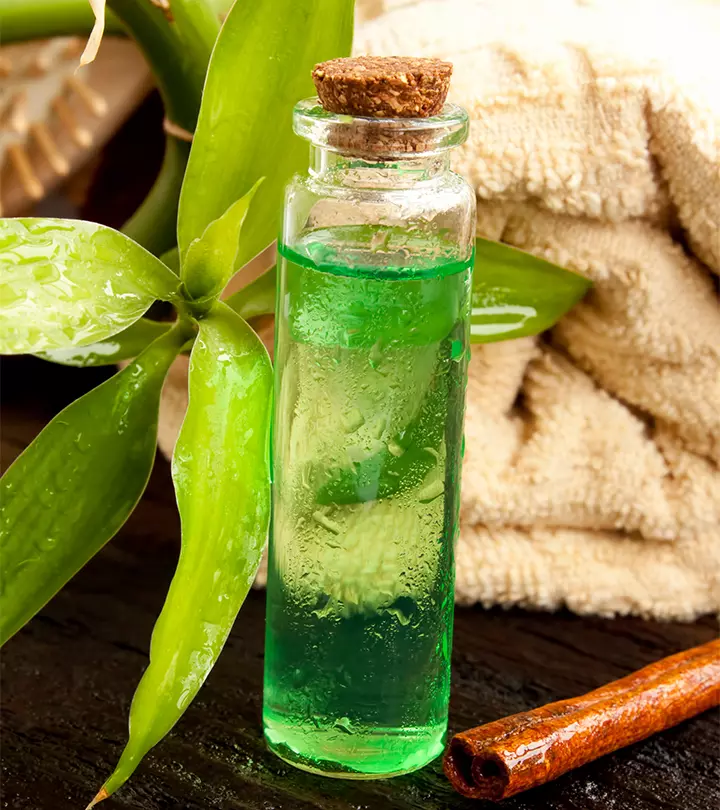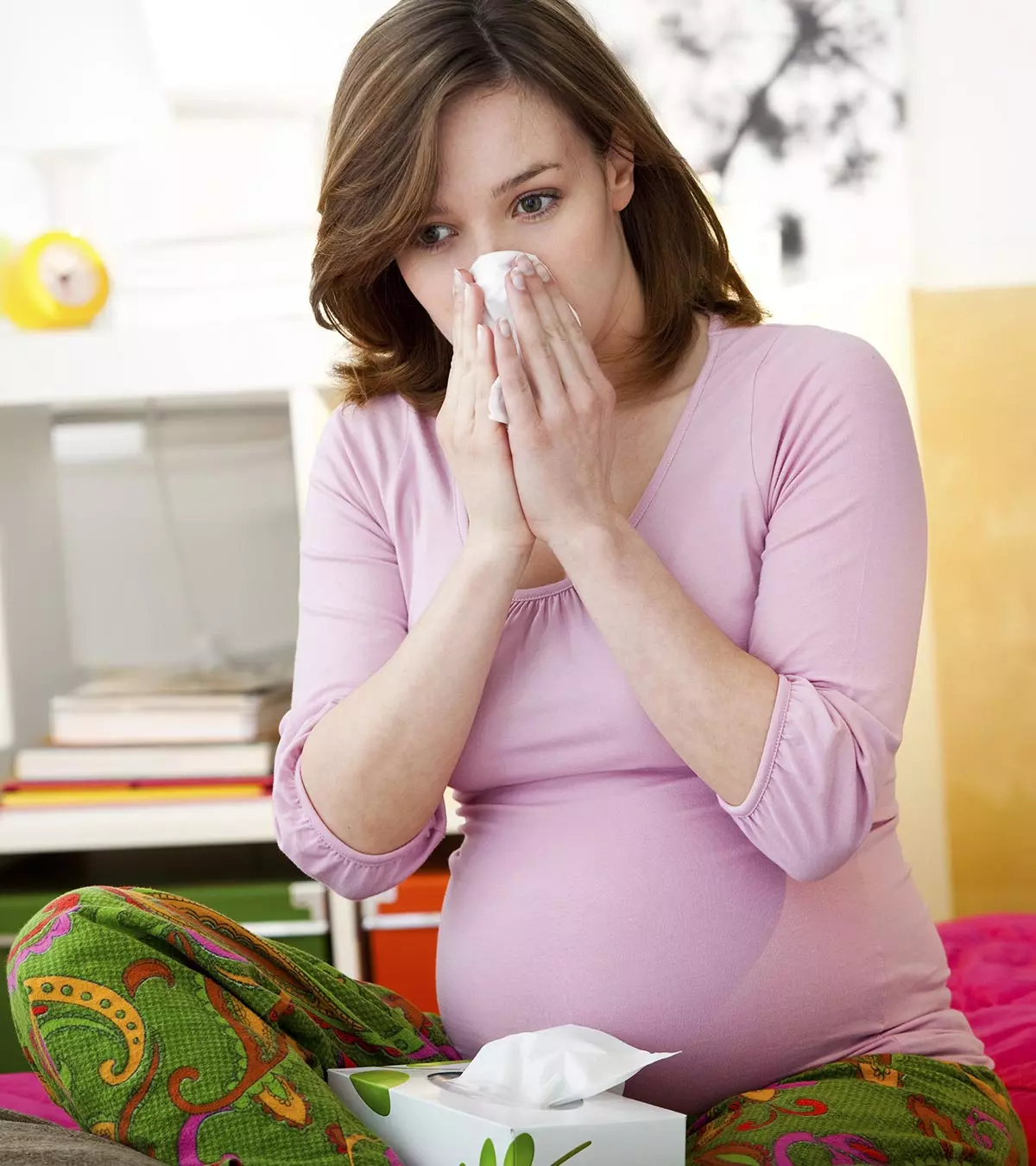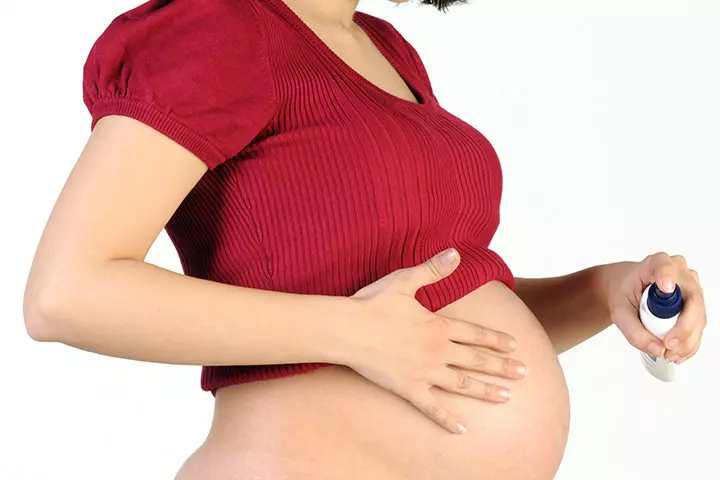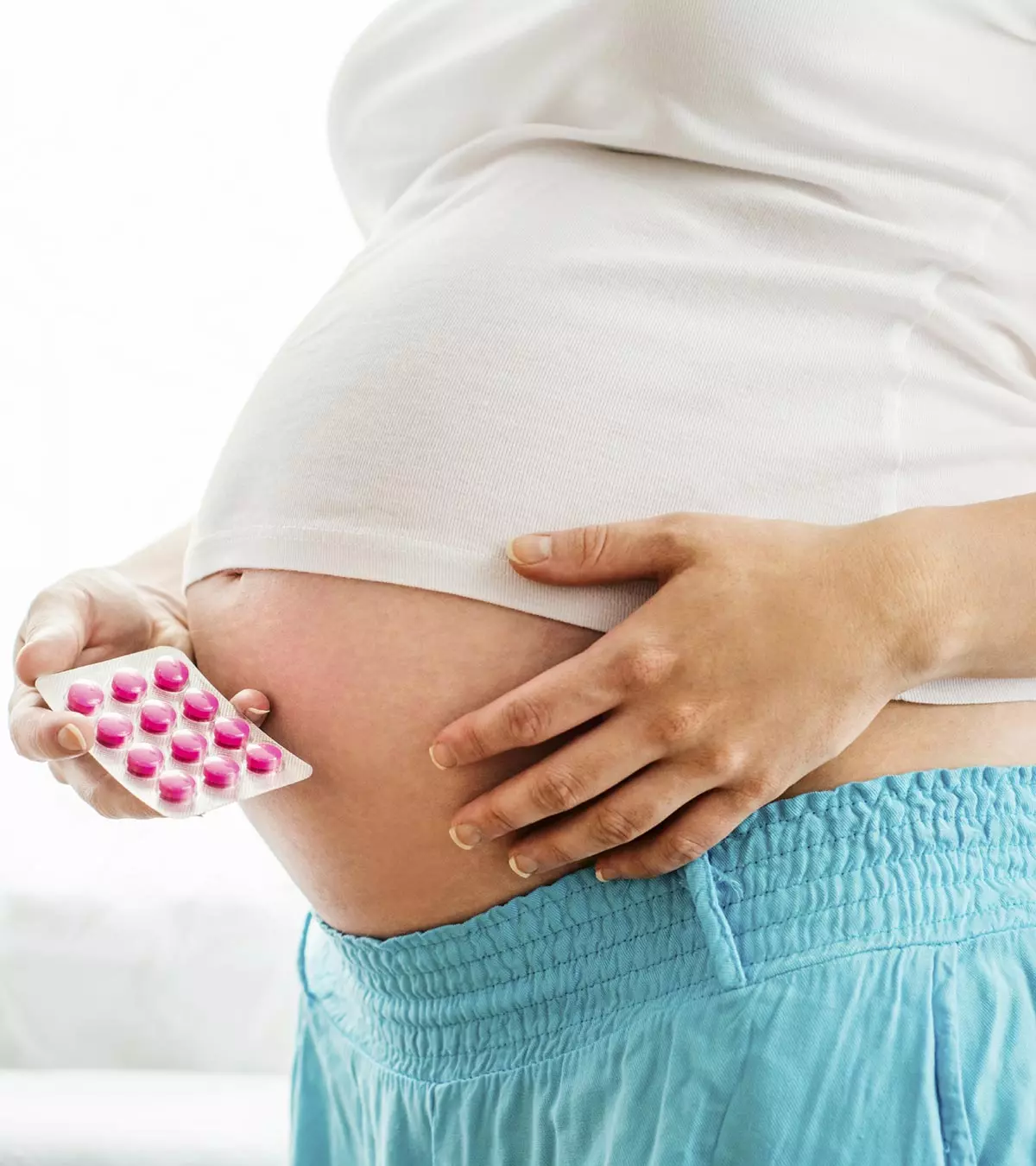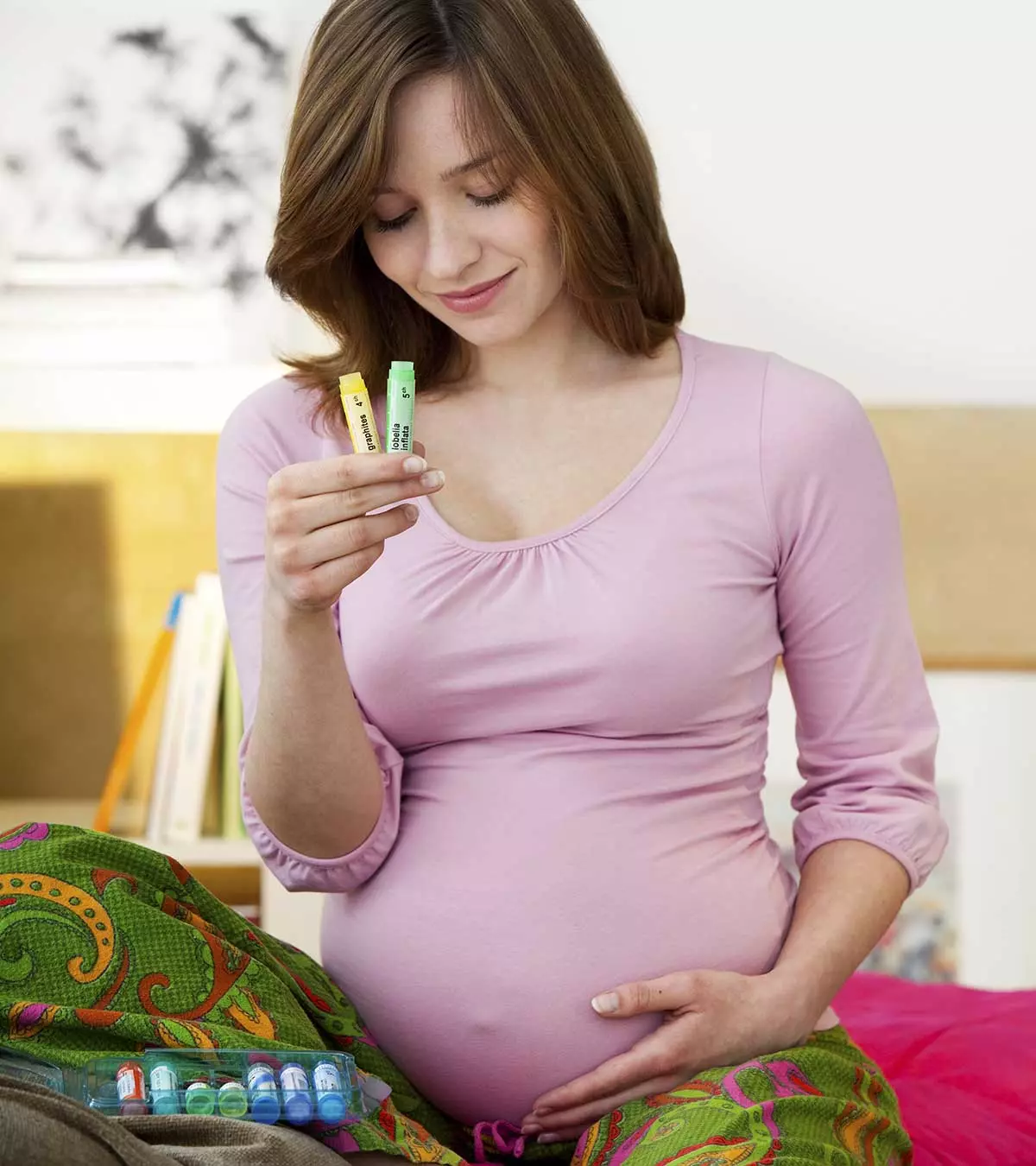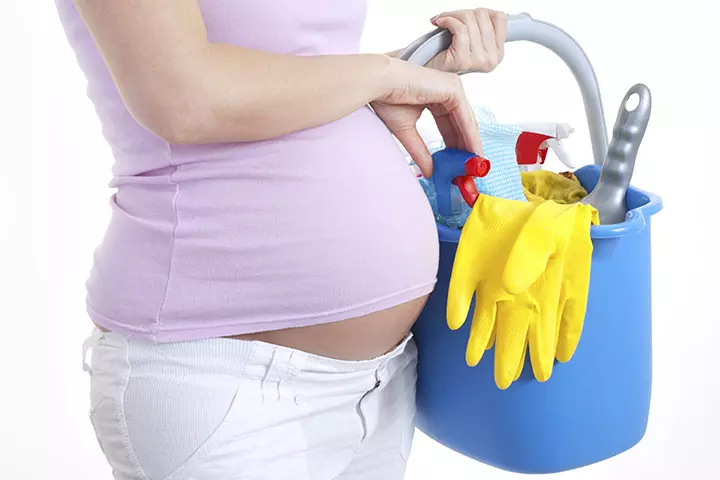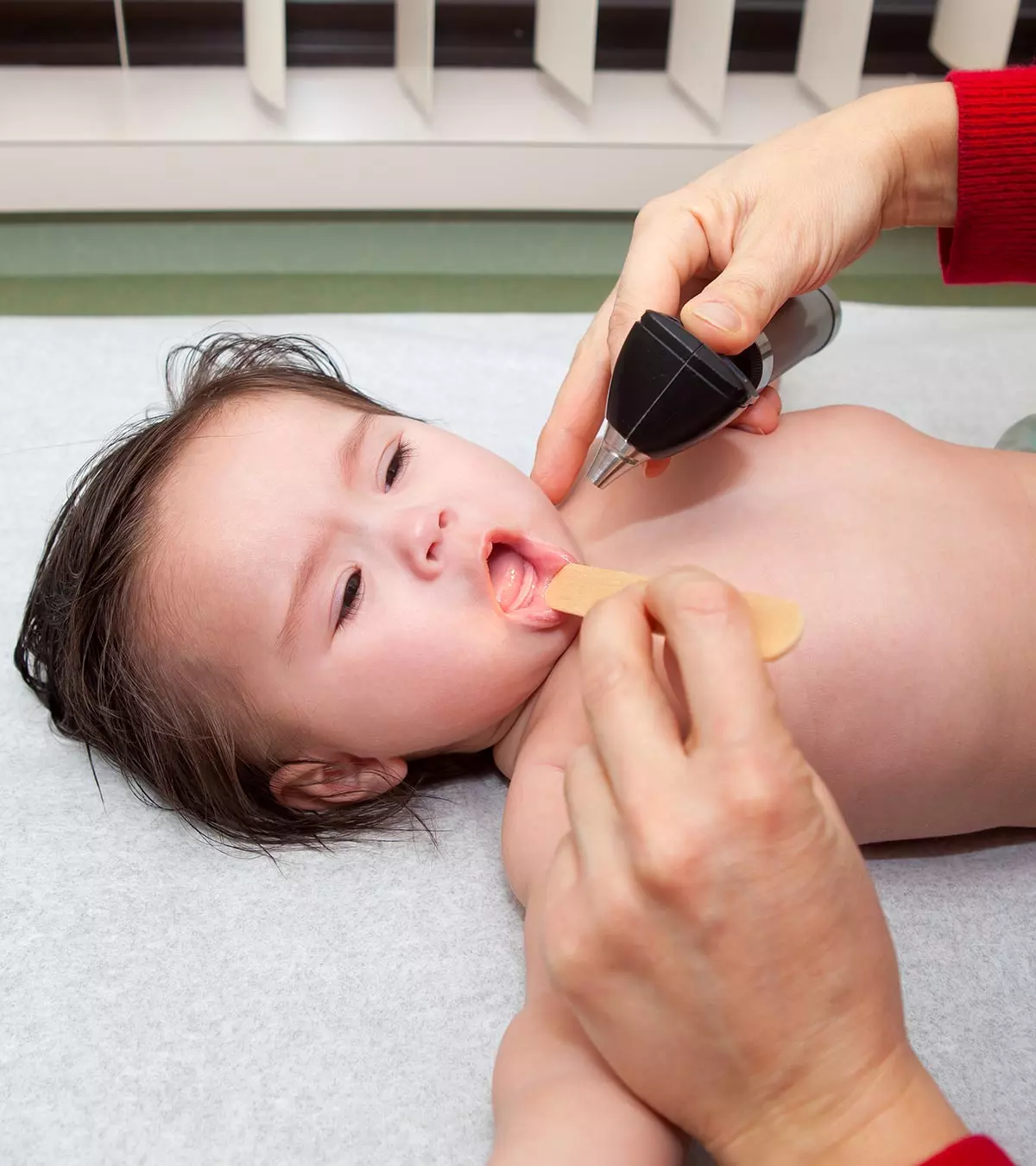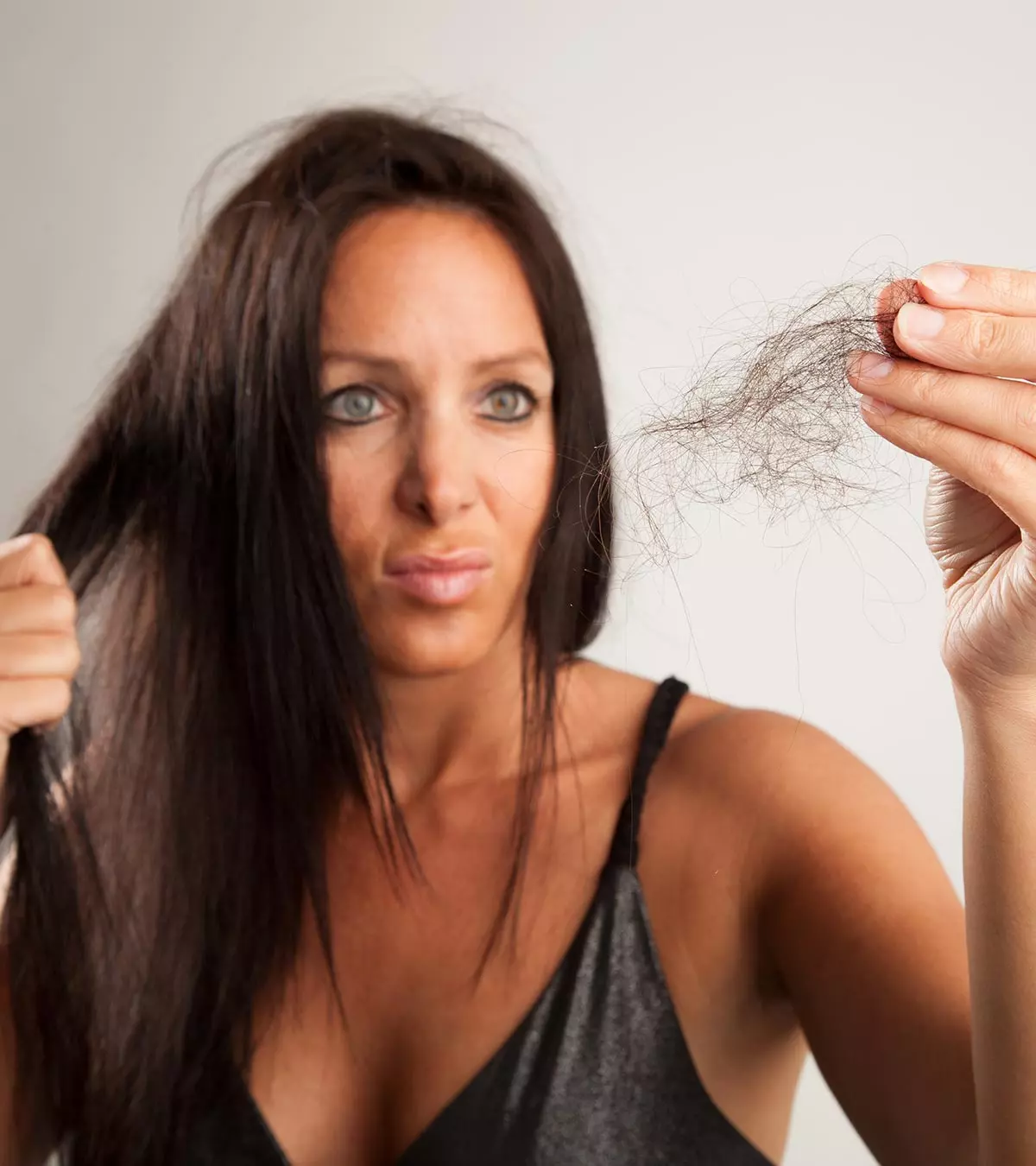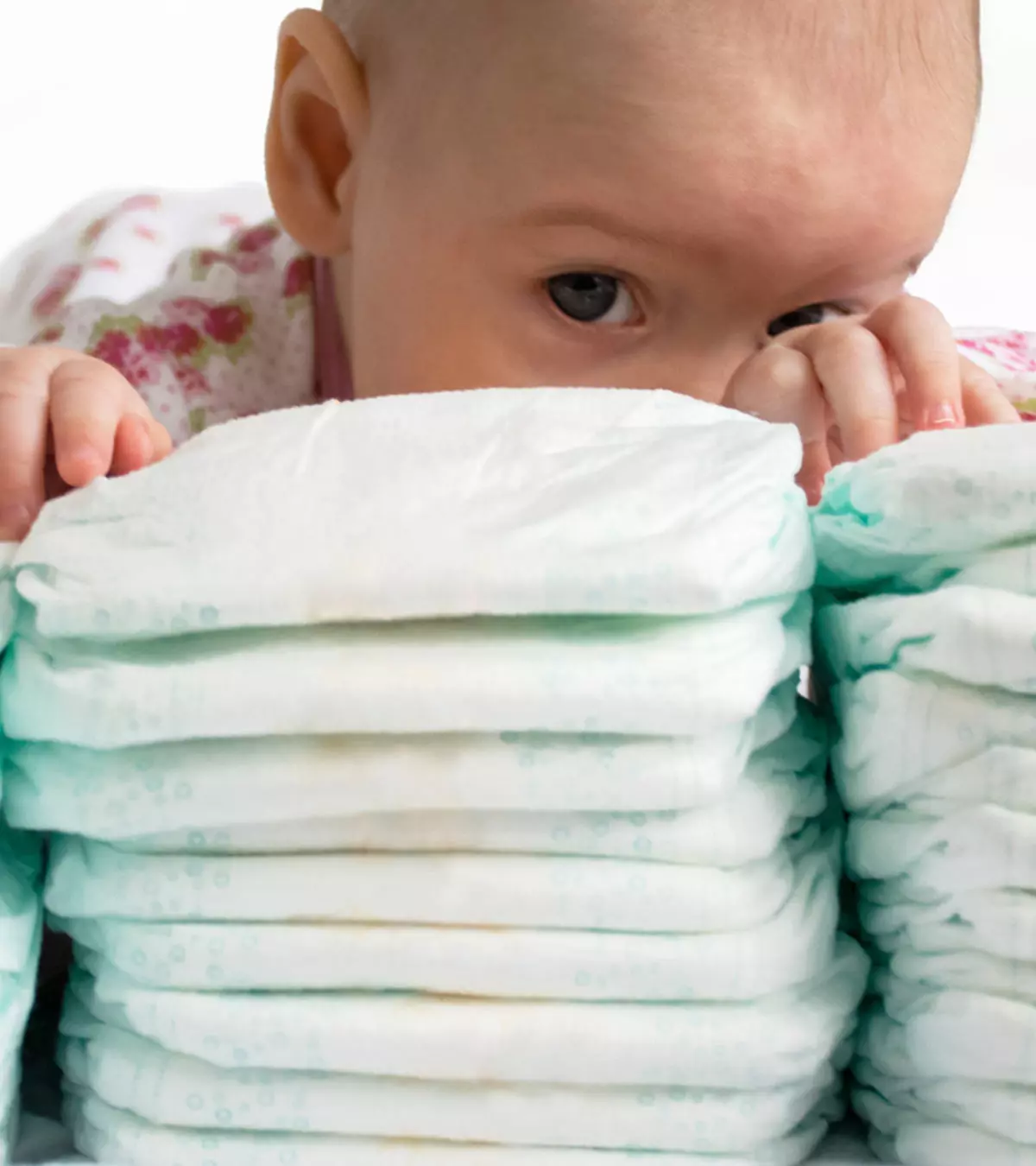
Image: ShutterStock
If you purchase disposable diapers for your baby, you may wonder do diapers expire and if you need to replace old diapers with new ones. A newborn may need up to seven diaper changes per day. Consider how many diapers you’ll need until the infant is pee- and potty-trained if you use disposable diapers.

As a result, the majority of parents stock diapers. Diapers are so close to a baby’s skin, making parents understandably concerned about their durability and the safety of using outdated diapers. So, Is it okay to repurpose old diapers? How can you tell if a diaper is past its expiration date?
This post clears most of your doubts. But first, let’s go over the various components of a diaper.
Key Pointers
- Diapers have a polyester or polypropylene absorbent first layer, a super absorbent polymer middle layer, and an outer waterproof sheet.
- The materials do not get spoiled but decreased absorbing capacity, leakage issues, and change in fragrance may occur past the expiry date as mentioned by the manufacturer.
- Keeping the diapers properly packed, away from moisture, heat, and light exposure may extend their shelf life.
What Are Disposable Diapers Made Of?
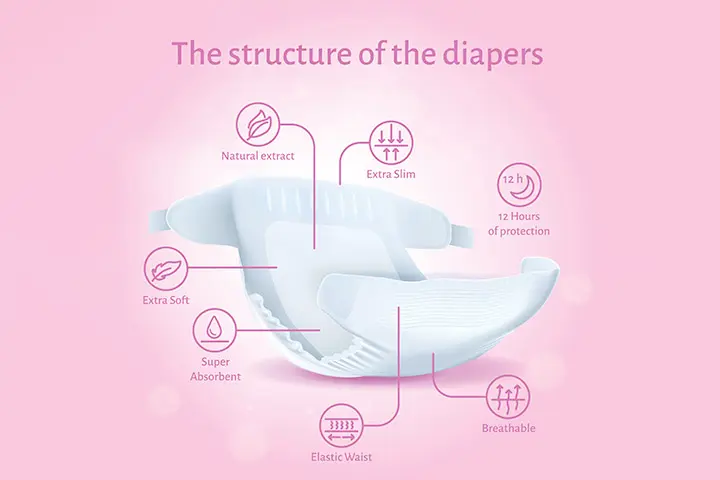
A typical disposable diaper constitutes four layers, with each layer made up of different materials.
- The inner layer or absorbent top sheet: The innermost layer, which is in direct contact with the baby’s skin, is typically made of polyester and polypropylene. The sheet is soft, allows free flow of air, and is leak-resistant.
- The middle layer or absorbent core: Beneath the inner sheet lies the absorbent layer where all the magic happens. It contains fluff pulp and chemical crystals, also known as super absorbent polymer (SAP).
The fluff pulp is usually made from natural ingredients such as wood pulp, corn, or wheat-based material. It distributes the liquid equally across the absorbent sheet, while the polymer absorbs and locks the liquid up to 30 times its weight.
- The outer sheet or cover: As it prevents the liquid from oozing out of the diaper, the outer cover is made of waterproof diaper material. Again, polypropylene and polyethylene are used to make the outer layer. It is soft, breathable, and durable.
These sheets have some prints or the brand logo of the manufacturer. The diaper manufacturers make sure the ink used for the print is safe for the baby’s delicate skin.
- Fasteners and other material: While some diapers come with fastener tapes, some have waistbands with stretch panels. Leg cuffs are standard for all the diapers. These components are also made with plastic fiber and elastic in most cases to provide a perfect fit and comfort to the baby.
To sum up, paper, plastic fiber, cloth, elastic, and SAP are the significant components of a diaper.
 Quick tip
Quick tipDo Diapers Expire?
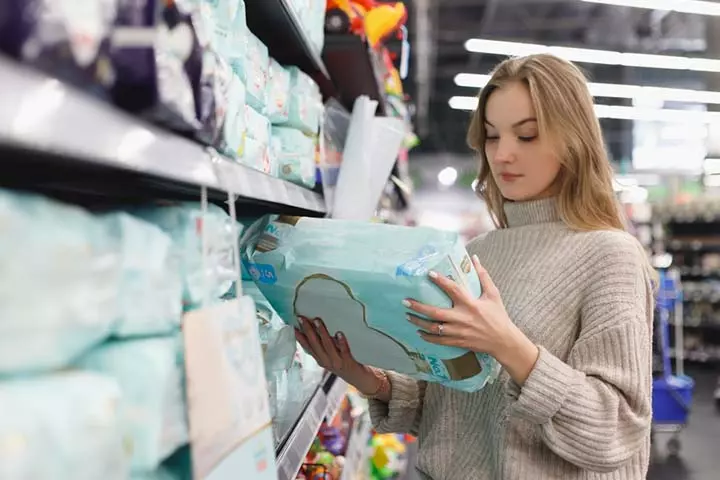
Like other baby products, diaper packaging also mentions an expiry date. As the components of a diaper are mostly paper and plastic-based, technically, they should last longer than the manufacturer-recommended timeframe of two to three years. Then why do brands mention the “Best Before” date on every diaper pack?
It is because they want you to use the diaper within a certain period to receive maximum benefits. Within the mentioned timeframe, a diaper is tested to deliver optimum performance.
Once the period is over, the manufacturer does not guarantee the same performance as advertised. After the diaper exceeds its best period, you might notice some aging effects such as discoloration of the outer layer, decreased diaper absorption capacity, leakage issues, and change in fragrance and diaper freshness. Although the diaper components may remain safe and not become harmful over time, their efficacy is reduced. Therefore, brands recommend a use-by date for diapers.
How To Identify An Old Diaper?
As mentioned above, an old diaper might exhibit various signs, making it easy for you to identify.
1. Change in color and odor
Keep a piece of paper aside for a few days without disturbing it and see how its tone changes to a yellow shade. Any paper product, when exposed to oxygen for a long time, tends to lose its color.
The same applies to a diaper, which is made with a mix of paper and plastic. The outer layer of the diaper might turn yellowish. You may also notice the patterns on the cover fade off with time.
As a change in diaper’s color is just a cosmetic factor, it may not affect its performance.
2. Change in fragrance
Not all disposable diapers have fragrance. But a few brands add scent or deodorizers to absorb unpleasant odors.
Irrespective of the addition, old diapers smell different from the new ones. It could be due to the molecule breakdown in the fragrance or exposure to external conditions. While the strongly scented diapers might lose their smell, the ones with the deodorizer might leave an unpleasant odor while using them.
This fancy feature may not affect the diaper’s efficiency.
3. Decreased absorbing capacity
The chemical crystals (SAP) used in diapers for babies are highly efficient in absorbing water from their surroundings. Even when not in use, they tend to pull the moisture from the air and the environment.
When using an old diaper, you might find a drop in its absorbing capacity as it is partially filled with moisture (from the surroundings). The longer you leave a pack of diapers open, the greater would be the loss.
A decrease in absorbing capacity affects the efficiency of a diaper. While using such diapers, you may have to change them more often than usual.
4. Leakage and fitting issues

Spandex, the material used for elasticity in leg cuffs and waistband, is resistant to heat and moisture. But if rubber or latex is added to it, it might breakdown over time. When there is no elasticity, especially in leg holes, you may have to deal with a leaky diaper.
Further, if the elastic in the waistband becomes loose, the diaper won’t stay in place and again leads to a leaky mess.
It’s not worth using a loose or ill-fitting diaper, as it affects the very function of a disposable diaper.
Is It Okay To Use Old Or Expired Diapers?
There is no such component in a diaper that has an expiry date. Even the chemical crystals used in the core do not get spoiled or turn harmful.
The changes you might notice in an old diaper are probably mild and may not cause serious problems. However, if you use the diapers within the manufacturer-mentioned period, say two to three years from the date of packing, you can expect maximum performance.
While using an old diaper, frequently check for any leaks and try to change it as soon as it becomes full for hygiene purposes. Most importantly, check for any itching or skin rashes in babies, in which case stop using the old diapers.
Alternatively, you can use cloth diapers and nappies, which can be reused after thoroughly washing.
 Quick Tip
Quick TipHow To Increase The Life Of A Diaper?

While it’s natural for the diapers to lose their efficiency after years of manufacturing, careful diaper storage might extend their life. Here are a few things you can do to preserve the diapers for future use.
- Moisture, heat, and light are the main factors that could damage diaper quality and condition. Store them in a dark, cool, and dry place.
- If you’re left with a full pack of diapers, don’t open it. Store it as-is in a cardboard box to prevent exposure to air and moisture.
- When you have an opened pack of diapers, tightly wrap it with a thin plastic sheet and secure with strong tape. Make sure there is no air inside.
- You can use a vacuum sealer to make a water- or airtight seal. It also helps you store more diapers in less space.
- You may also consider buying a specifically designed diaper storage bag to protect diapers from moisture and light and help them keep clean and dry.
Frequently Asked Questions
1. How many diapers does a newborn use in a week?
Newborns may use about 30 – 56 diapers per week (1). Remember, no two babies are alike, and these numbers can significantly vary across infants.
2. What size diapers do babies stay in the longest?
It is believed that size three diapers are used for the longest time by babies. Nevertheless, it may vary among babies and also depend on the diaper brand preferred by the parents.
3. Do diapers cause urine infections in babies?
Letting the baby or toddler stay in soiled diapers for too long may lead to a persistent baby diaper rash and increase the risk of urinary tract infections. This may be because the reduced diaper changing gives more time for the bacteria or other microbes to enter the urinary tract from the dirty diapers (2) (3).
Buying diapers in bulk is more economical since newborns use several diapers a day. However, bulk buying might make you wonder do diapers expire? Though using expired diapers does not pose any health concerns to the baby, they may lose their effectiveness over time. For example, they may have decreased absorbing capacity, leakage, and fitting issues. Hence, store the diapers properly and check frequently to avoid leaks when using an old diaper. However, if your baby develops any skin issues or rashes, discontinue its use and consult your pediatrician.
Infographic: Preventing Wastage Of Disposable Diapers Due To Expiration
Although diapers don’t necessarily expire, they run out of their maximum productivity due to the effect of time. Manufacturers of disposable diapers may even mention a use-by date. In the infographic below, we present tips to use disposable diapers better, so they do not get wasted due to expiration.
Some thing wrong with infographic shortcode. please verify shortcode syntax
Illustration: Do Diapers Expire? Is It Safe To Use Old Diapers For Baby?
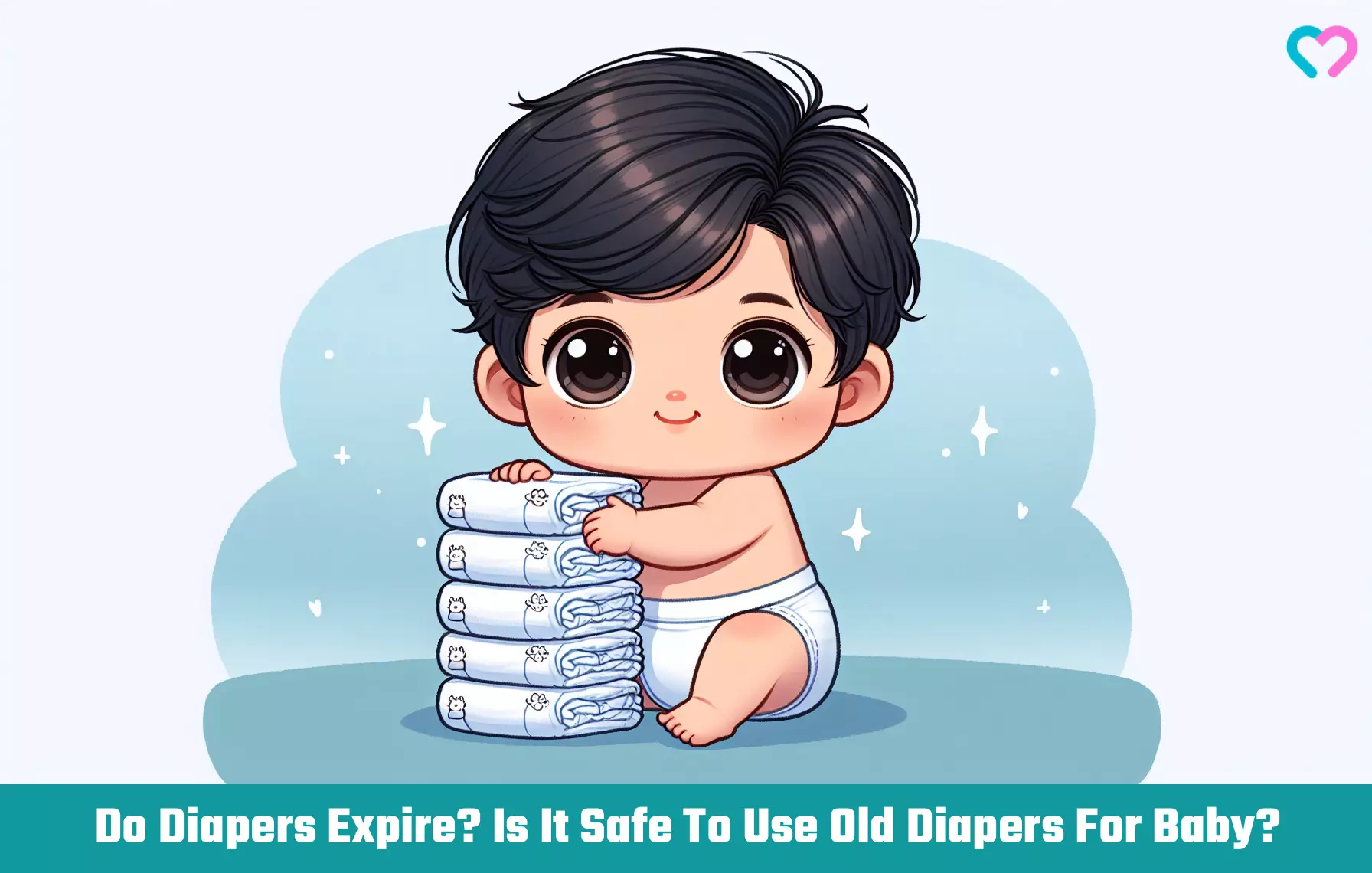
Image: Stable Diffusion/MomJunction Design Team
Watch as we explore the fascinating process of how diapers are made! From raw materials to the finished product, you won’t want to miss it!
References
- How Many Wet Diapers Should My Newborn Baby Have?
https://www.lanermc.org/community/lane-health-blog/how-many-wet-diapers-should-my-newborn-baby-have - Tetsu Sugimura et al. (2009); Association between the frequency of disposable diaper changing and urinary tract infection in infants.
https://pubmed.ncbi.nlm.nih.gov/18648080/#:~:text=Conclusions%3A%20Among%20infants%20wearing%20disposable - Urinary Tract Infections In Babies.
https://www.nationwidechildrens.org/family-resources-education/700childrens/2013/11/urinary-tract-infections-in-babies
Community Experiences
Join the conversation and become a part of our nurturing community! Share your stories, experiences, and insights to connect with fellow parents.
Read full bio of Shelly Taft
Read full bio of Rohit Garoo
Read full bio of Dr. Ritika Shah
Read full bio of Ghazia Shah






